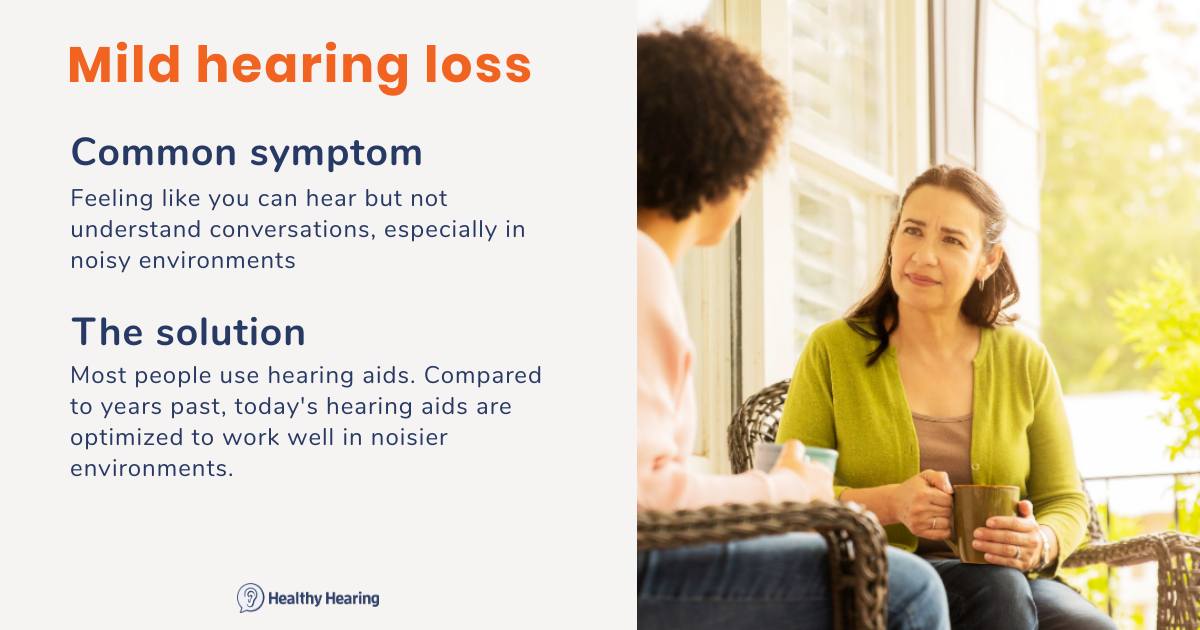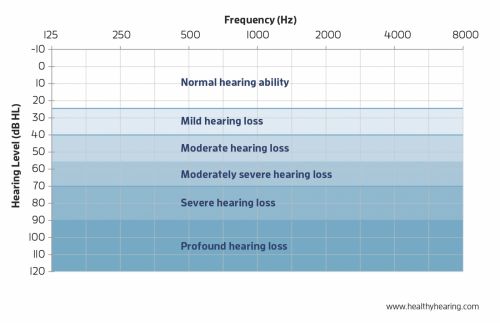Hearing loss is divided into degrees of severity from mild to profound. If you have mild hearing loss, your hearing loss isn’t severe and you can likely “fake it until you make it” in many social situations.
However, despite how it sounds, “mild” hearing loss doesn’t mean harmless—it can still have profound effects on your quality of life and ability to communicate with loved ones and coworkers. And because it’s mild, these effects may be more insidious than obvious.

What is mild hearing loss?
Mild hearing loss is defined by being unable to hear sounds that are quieter than about 25 decibels (dB) for adults and 15 dB for children. This includes sounds like whispered conversations, dripping water, leaves rustling, feet shuffling on floors/carpets, and birds chirping. You may struggle with hearing both low-pitched and high-pitched sounds (known as frequency) in that sound range, though most people stop hearing high-frequency pitches first.
A person with mild hearing loss may struggle to hear sounds like dripping water, quiet conversations, leaves rustling, feet shuffling on floors/carpets, and birds chirping.
Degrees of hearing loss include normal, mild, moderate, moderately severe, severe and profound. These ranges are identified on an audiogram, one of the tests you’ll undergo as part of a hearing evaluation. An adult’s normal hearing range is between 0-25 dB across the frequency range. Normal hearing for children is between 0-15 dB.

How does mild hearing loss affect communication?
People with mild hearing loss often say they hear well in quiet environments when talking one-on-one with someone; however, not so well when they are in noisy environments, nor when a person is facing away or is standing some distance away from them, according to audiologist Dr. Melissa Danchak, AuD, of Kos/Danchak Audiology and Hearing Aids in Arlington, Texas.
People with mild hearing loss often report that they can hear but can’t understand conversations clearly.
What causes mild hearing loss?
There are many other reasons you might receive a diagnosis of mild hearing loss. Some of them, when diagnosed and treated promptly, may result in restored hearing.
- Noise exposure and aging are by far the two most common causes of mild hearing loss.
- An excess of cerumen (earwax). If you suspect earwax is the culprit, try using an over-the-counter solution such as Debrox or Odinell, which is available at most major drugstores. If this doesn’t resolve the situation, the buildup may be impacted and require removal by an audiologist or physician. (Remember, do not put cotton swabs or other objects in the ear canal, please. They can impact the earwax and/or puncture your eardrum, causing even more trouble.)
- Ear infection. Although children have a greater incidence of ear infections, they can still occur as an adult. If you experience hearing loss and an earache, especially one accompanied by a discharge and fever, see a medical professional immediately.
- Bone abnormalities in the middle ear. If the small bones of the middle ear aren’t doing their job properly, your inner ear won’t receive the signals it needs to transmit sound to the brain. This occurs with otosclerosis.
- Other medical conditions such as Meniere’s disease, acoustic neuromas and head trauma can cause hearing loss.
“These conditions would all need to first be treated by either a family physician, pediatrician or otolaryngologist,” Dr. Danchak said, “and could eventually lead to referral to an audiologist of medical treatment cannot resolve the loss.”
Other causes of hearing loss result in permanent loss that cannot be reversed with medical intervention and would require treatment using amplification from hearing aids or devices like cochlear implants. These include:
- Birth defects, which may include hereditary issues or infections the mother contracted during pregnancy
- Genetic factors such as Usher’s Syndrome and Penrod Syndrome.
“Fortunately,” Dr. Danchak said, “the digital hearing aids available today do a fantastic job at amplifying the sounds you want to hear while managing the background noise so that an individual can enjoy interacting with others more naturally again.”
Can you prevent mild hearing loss?
The most preventable type of hearing loss is noise-induced hearing loss (NIHL), a condition which affects millions of Americans, hearing loss statistics show. Many types of hearing protective devices are available to help you keep your hearing safe from NIHL:
- Foam earplugs, available at most drug stores, are ideal for basic noise prevention
- In-ear monitors, custom-made devices for musicians to protect hearing and control the amount of sound they hear for each instrument and person in the band.
- Filtered earplugs, great for music lovers who want to enjoy a concert without affecting the fidelity of sound
- Percussive filters, custom molded for hunters to block out the loud sound of the gun blast yet still allow normal conversation to filter through. More on shooting sports and hearing loss.
“The only other preventative measure one can take is to seek medical treatment right away whenever they notice a change of hearing,” Dr. Danchak said. “Whether it is treatment for an ear infection or something more serious like a viral infection or autoimmune attack on the inner ear, it is important not to delay making an appointment to see a physician. Earlier treatment yields better outcomes.”
Hearing aids for mild hearing loss
People with mild hearing loss are often candidates for hearing aids. Hearing aid technology has come a long way, and today’s devices are sleek, stylish and customizable to any degree of hearing loss. Hearing aids exist for every lifestyle and budget.
There is good news for hearing aid wearers with mild hearing loss. First, you will have more choices of hearing aid types and styles available to you compared with someone whose hearing loss has progressed to the point of being severe to profound. You may be able to wear smaller hearing aids, too.
Why is it important to seek treatment?
Recent studies have found that even mild degrees of untreated hearing loss can increase the risk of developing conditions such as cognitive decline, dementia and Alzheimer’s compared to peers with normal hearing. Hearing loss can also lead to increased social isolation, depression and risk for falls—not to mention difficulty in communicating with those around you on a daily basis.
“Even though the world ‘mild’ makes one think it’s not really that bad, mild loss can have serious consequences.”
“Even though the world ‘mild’ makes one think it’s not really that bad, mild loss can have serious consequences,” Dr. Danchak said. “Why should a person live with a reduced quality of life due to hearing loss when the amplification options today are so advanced that they not only provide magnificent quality of sound, they are also wireless interfaces to your cell phone and other Bluetooth accessories?”
Don’t wait to treat mild hearing loss. Here’s why.
People who first discover a hearing loss wait an average of seven years to seek help with hearing aids. During this time, the hearing loss progresses, and the brain “forgets” how to hear sound properly. People who procrastinate too long become less able to understand speech over time. Catching a hearing loss when it is mild gives you the best chance for success with hearing aids and rehabilitation now and in the future.
How to get help
The first step to better hearing is to schedule an appointment with a hearing healthcare professional for a hearing evaluation. This initial test acts as a baseline for future examinations so your professional can accurately monitor your hearing health going forward. Get started by visiting our professional directory to find a hearing aid clinic near you.
